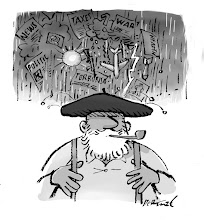Pío Baroja y Nessi (1872 – 1956) was a Spanish Basque writer, one of the key novelists of the Generation of '98. He was a member of an illustrious family, his brother Ricardo was a painter and engraver, and his nephew Julio Caro Baroja was a well known anthropologist.
Although educated as a physician, Baroja only practised this trade briefly. As a matter of fact, he would use his student's memories - some of them he would consider terrible - as the raw material for his novel "The Tree of Knowledge". He also managed the family bakery for a short time and ran unsuccessfully on two occasions for a seat at the Cortes (Spanish parliament) as a Radical Republican. Baroja's true calling, however, was always writing, which he began seriously at the age of 13.
His first novel --La casa de Aizgorri (The House of Aizgorri, 1900)-- is part of a trilogy called La Tierra Vasca (The Basque Country, 1900–1909). This trilogy also includes El Mayorazgo de Labraz(The Lord of Labraz, 1903) which became one of his most popular novels in Spain.
However, he is best known internationally by another trilogy entitled La lucha por la vida (The Struggle for Life, 1922–1924) which offers a vivid depiction of life in Madrid's slums.
Some believe his masterpiece to be El árbol de la ciencia (1911) (translated as The Tree of Knowledge), a pessimistic Bildungsroman that depicts the futility of the pursuit of knowledge and of life in general.
In keeping with Spanish literary tradition, Baroja often wrote in a pessimistic, picaresque style. His deft portrayal of the characters and settings brought the Basque region to life much as Benito Pérez Galdós' works offered an insight into Madrid. Baroja's works were often lively, but could be lacking in plot and are written in an abrupt, vivid, yet impersonal style. Sometimes he is even accused of grammatical errors, which he never denied.
Baroja as a young man believed loosely in anarchistic ideals, as other members of the '98 Generation. His vitalistic vision of life -although pessimistic- led his novels, his ideas and his figure to be considered somehow a precursor of a kind of Spanish fascism. In any case, he was not loved by Catholic and traditionalist ideologists and his life was at risk during the Spanish Civil War (1936-39).
Ernest Hemingway was greatly influenced by Baroja, although this is not fully appreciated by English-speaking critics.














+Ltd+girls+marching+team+competing+in+the+third+annual+sports+meeting+of+the+Wellington+Inter-House+Girls%27+Association+at+the+Basin+Reserve+in+November+1935.jpg)

,+6th+April+1920.jpg)



































